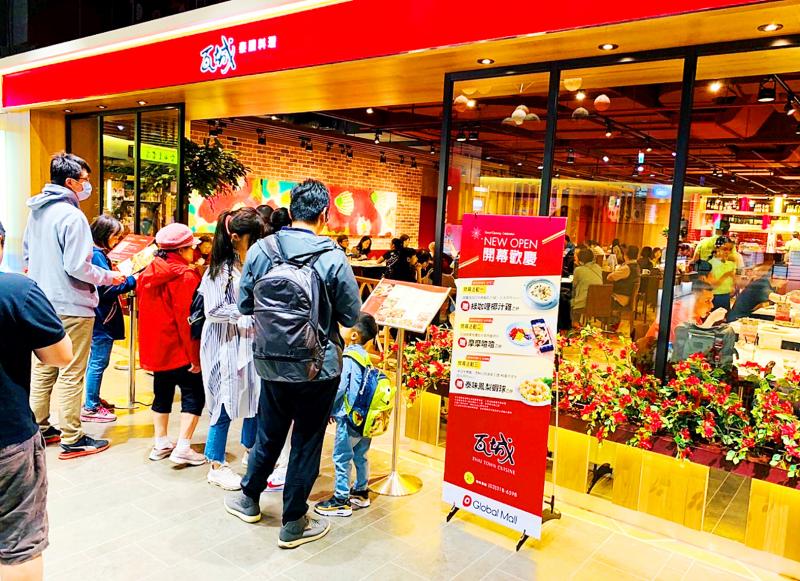Restaurant chain operator TTFB Co Ltd (瓦城泰統集團) yesterday offered a positive outlook for the second half of the year, after revenue last month grew 96.86 percent from a year earlier.
A substantial increase in dine-in customers combined with a steady recovery in the local food-and-beverage market, as well as the arrival of the traditional high season for restaurants, are expected to boost the company’s sales in the coming months, the nation’s largest Thai food and full-service restaurant chain operator said in a statement.
TTFB operates six restaurant chains — Thai Town Cuisine (瓦城泰式料理), Very Thai Restaurant (非常泰), 1010 Hunan Cuisine (1010湘), Very Thai Noodles (大心新泰式麵食), Ten Ten Hunan Bistro (十食湘) and Shann Rice Bar (時時香) — as well as new cuisine brands Yabi Kitchen and Thai BBQ.

Photo courtesy of TTFB Co Ltd
As of the end of June, the company operated 135 stores in Taiwan and four in China, it said in the statement.
TTFB this year continued to develop new services and expand its sales channels, even as COVID-19 flare-ups discouraged many people from gathering outdoors in the second quarter.
With bleak sales in the April-to-June quarter, TTFB’s revenue for the first half of the year dropped 6.01 percent year-on-year to NT$2.06 billion (US$68.7 million), while it reported a net loss of NT$28.45 million, or a net loss per share of NT$1.24.
That was a 127.06 percent decline from net profit of NT$$105.11 million a year earlier, or earnings per share of NT$4.59, company data showed.
First-half gross margin fell to 47 percent from 51.36 percent a year earlier, it said.
The company’s operations in China posted net losses of NT$23 million in the first half, as strict COVID-19 lockdown measures in Shanghai severely affected its headline figures, it said.
As sales started out strong this quarter after last month’s revenue hit NT$430.66 million, up from NT$311.95 million in June, the company said it is optimistic about its outlook for this quarter and next quarter, citing the business potential of the upcoming Mid-Autumn Festival, Double Ten National Day and year-end banquet season, the statement said.
TTFB launched four new stores in Taiwan in the first half of the year, and aims to retain a double-digit increase in new store openings this year, as the company expects a larger scale of operations and a wide variety of restaurant brands to further boost sales, it said.

Taiwan Semiconductor Manufacturing Co (TSMC, 台積電) last week recorded an increase in the number of shareholders to the highest in almost eight months, despite its share price falling 3.38 percent from the previous week, Taiwan Stock Exchange data released on Saturday showed. As of Friday, TSMC had 1.88 million shareholders, the most since the week of April 25 and an increase of 31,870 from the previous week, the data showed. The number of shareholders jumped despite a drop of NT$50 (US$1.59), or 3.38 percent, in TSMC’s share price from a week earlier to NT$1,430, as investors took profits from their earlier gains

In a high-security Shenzhen laboratory, Chinese scientists have built what Washington has spent years trying to prevent: a prototype of a machine capable of producing the cutting-edge semiconductor chips that power artificial intelligence (AI), smartphones and weapons central to Western military dominance, Reuters has learned. Completed early this year and undergoing testing, the prototype fills nearly an entire factory floor. It was built by a team of former engineers from Dutch semiconductor giant ASML who reverse-engineered the company’s extreme ultraviolet lithography (EUV) machines, according to two people with knowledge of the project. EUV machines sit at the heart of a technological Cold

TAIWAN VALUE CHAIN: Foxtron is to fully own Luxgen following the transaction and it plans to launch a new electric model, the Foxtron Bria, in Taiwan next year Yulon Motor Co (裕隆汽車) yesterday said that its board of directors approved the disposal of its electric vehicle (EV) unit, Luxgen Motor Co (納智捷汽車), to Foxtron Vehicle Technologies Co (鴻華先進) for NT$787.6 million (US$24.98 million). Foxtron, a half-half joint venture between Yulon affiliate Hua-Chuang Automobile Information Technical Center Co (華創車電) and Hon Hai Precision Industry Co (鴻海精密), expects to wrap up the deal in the first quarter of next year. Foxtron would fully own Luxgen following the transaction, including five car distributing companies, outlets and all employees. The deal is subject to the approval of the Fair Trade Commission, Foxtron said. “Foxtron will be

INFLATION CONSIDERATION: The BOJ governor said that it would ‘keep making appropriate decisions’ and would adjust depending on the economy and prices The Bank of Japan (BOJ) yesterday raised its benchmark interest rate to the highest in 30 years and said more increases are in the pipeline if conditions allow, in a sign of growing conviction that it can attain the stable inflation target it has pursued for more than a decade. Bank of Japan Governor Kazuo Ueda’s policy board increased the rate by 0.2 percentage points to 0.75 percent, in a unanimous decision, the bank said in a statement. The central bank cited the rising likelihood of its economic outlook being realized. The rate change was expected by all 50 economists surveyed by Bloomberg. The